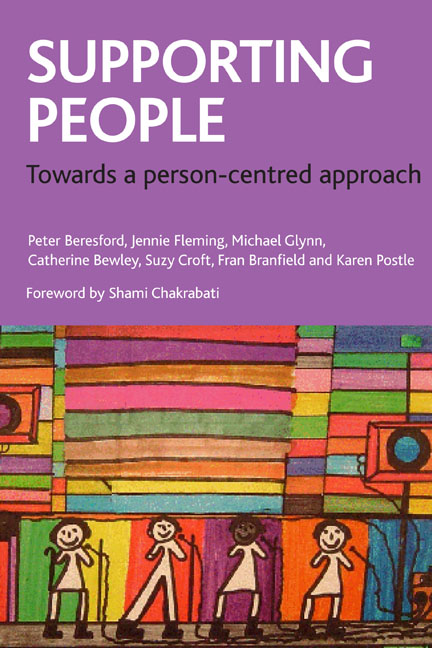Book contents
- Frontmatter
- Dedication
- Contents
- About the authors
- Acknowledgements
- Foreword
- Introduction
- Part One The Background to Person-Centred Support
- Part Two Person-Centred Support: Barriers and Ways of Overcoming Them
- Part Three Broader Issues for Person-Centred Support
- Part Four Making Change to Achieve Person-Centred Support
- Appendices
nine - Service user cameos
Published online by Cambridge University Press: 01 September 2022
- Frontmatter
- Dedication
- Contents
- About the authors
- Acknowledgements
- Foreword
- Introduction
- Part One The Background to Person-Centred Support
- Part Two Person-Centred Support: Barriers and Ways of Overcoming Them
- Part Three Broader Issues for Person-Centred Support
- Part Four Making Change to Achieve Person-Centred Support
- Appendices
Summary
Introduction
In this part of the book we offer a few more detailed accounts of some particular people we encountered in the Standards We Expect project which we have drawn upon. By offering such in-depth flesh and blood stories, we hope we can offer further insights into both the experience of person-centred support and some of the barriers that can be encountered in developing and practising it. All of these accounts are offered with the agreement of the people involved and are based on conversations and discussions with them. We have sometimes changed minor details so that people who don't wish to, can't be identified and their anonymity compromised. All are ‘real people’, but Serena's story is a compilation of the experience of several people. We have also changed people's names to protect their privacy.
Christopher's account highlights just what a difference leaving an institution and living on direct payments can make for a disabled person, as well as the amount of effort it demands – both of the person themselves and those seeking to support them. Roger and Bernadette's story shows how rich a life people can have together and the contribution they can make to their community, but also sometimes the difficulties they face and must overcome for this to be realised. Abdul's narrative tells us about the continuing problems there can be even when services are working hard to provide person-centred support as well as the importance of meeting people who share your ethnic background. Finally, we hear from Serena who draws together the experience of several young disabled people living in a residential home.
When you read these cameos, you might want to reflect on whether there are any particular themes or issues which seem to emerge as particularly important or which tend to recur. We will return to this at the end of the chapter.
Christopher's story
Christopher is a white man in his fifties who uses a wheelchair. He has a speech impairment. He was born in the United States and lived there until coming to England when he was five. The story of his life highlights the contrast between living in residential homes and living independently using direct payments.
- Type
- Chapter
- Information
- Supporting PeopleTowards a Person-Centred Approach, pp. 253 - 268Publisher: Bristol University PressPrint publication year: 2011



